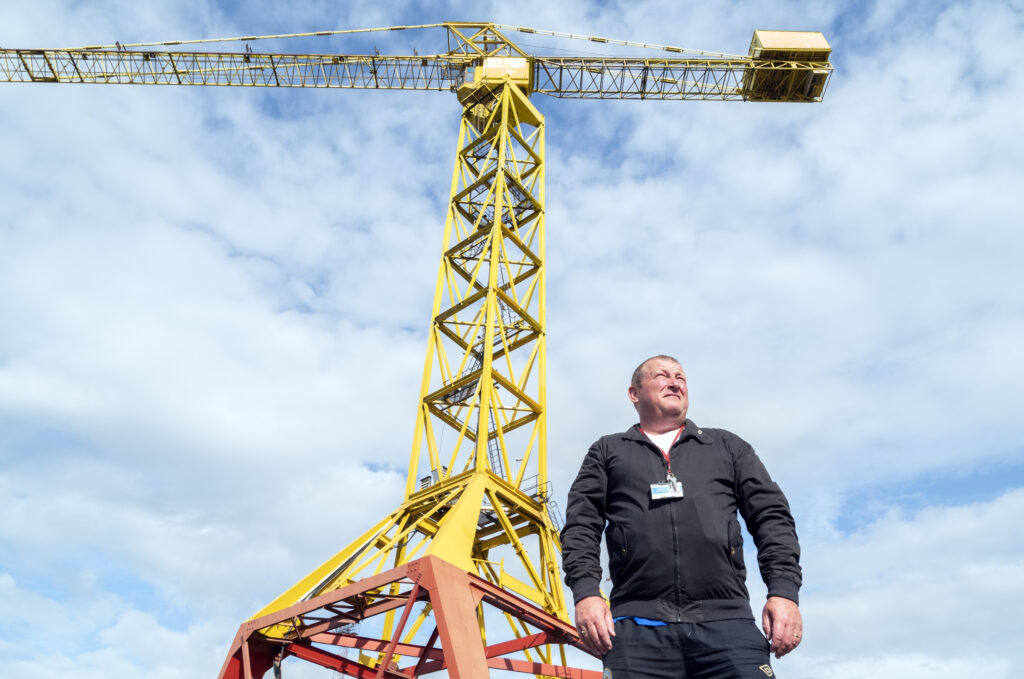13 November, 2019There are hundreds of millions of unionized workers around world. Do we share a common vision?
TEXT: Walton Pantland
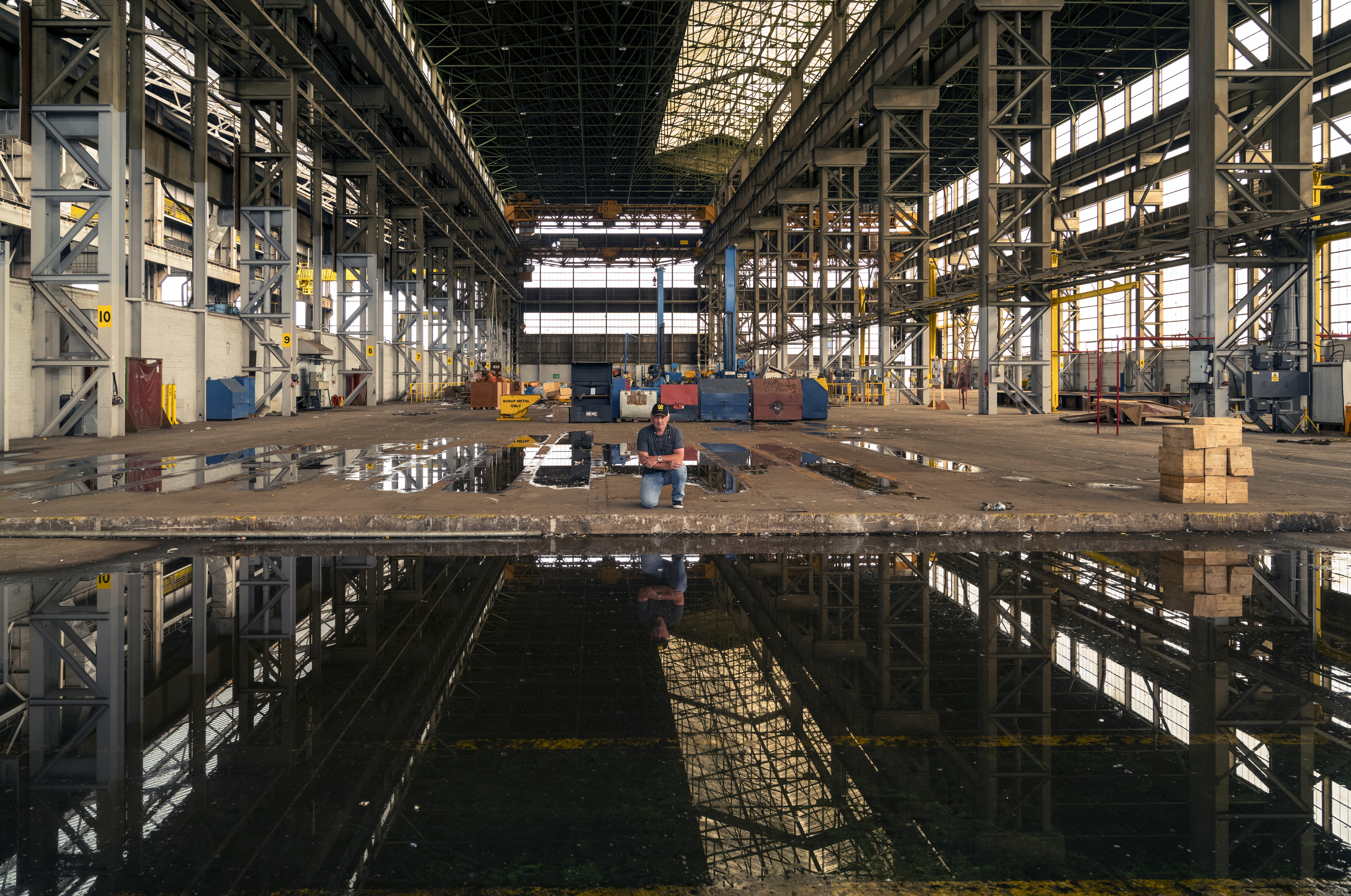
TEXT
Heading
TEXT
Heading
TEXT
Heading
TEXT
Heading
TEXT
Heading
TEXT
Heading
TEXT
Heading
TEXT
Heading
TEXT
In August 2019, workers at Harland and Wolff in Belfast, Northern Ireland, occupied the shipyard that built the Titanic. The owner was broke; the UK government refused to step in to save the yard. It was threatened with closure. The workers occupied their workplace to demand that the yard be saved, and used to build platforms for offshore windfarms and tidal power installations.
Type
Type your title here
Type your caption
They defended their jobs and their industrial heritage, but also looked to the future.
What was missing was a comprehensive Just Transition plan – a Green New Deal – to save their yard and create green jobs.
After a nine-week occupation, the yard was saved when a buyer was announced in October.
They defended their jobs and their industrial heritage, but also looked to the future.
What was missing was a comprehensive Just Transition plan – a Green New Deal – to save their yard and create green jobs.
After a nine-week occupation, the yard was saved when a buyer was announced in October.
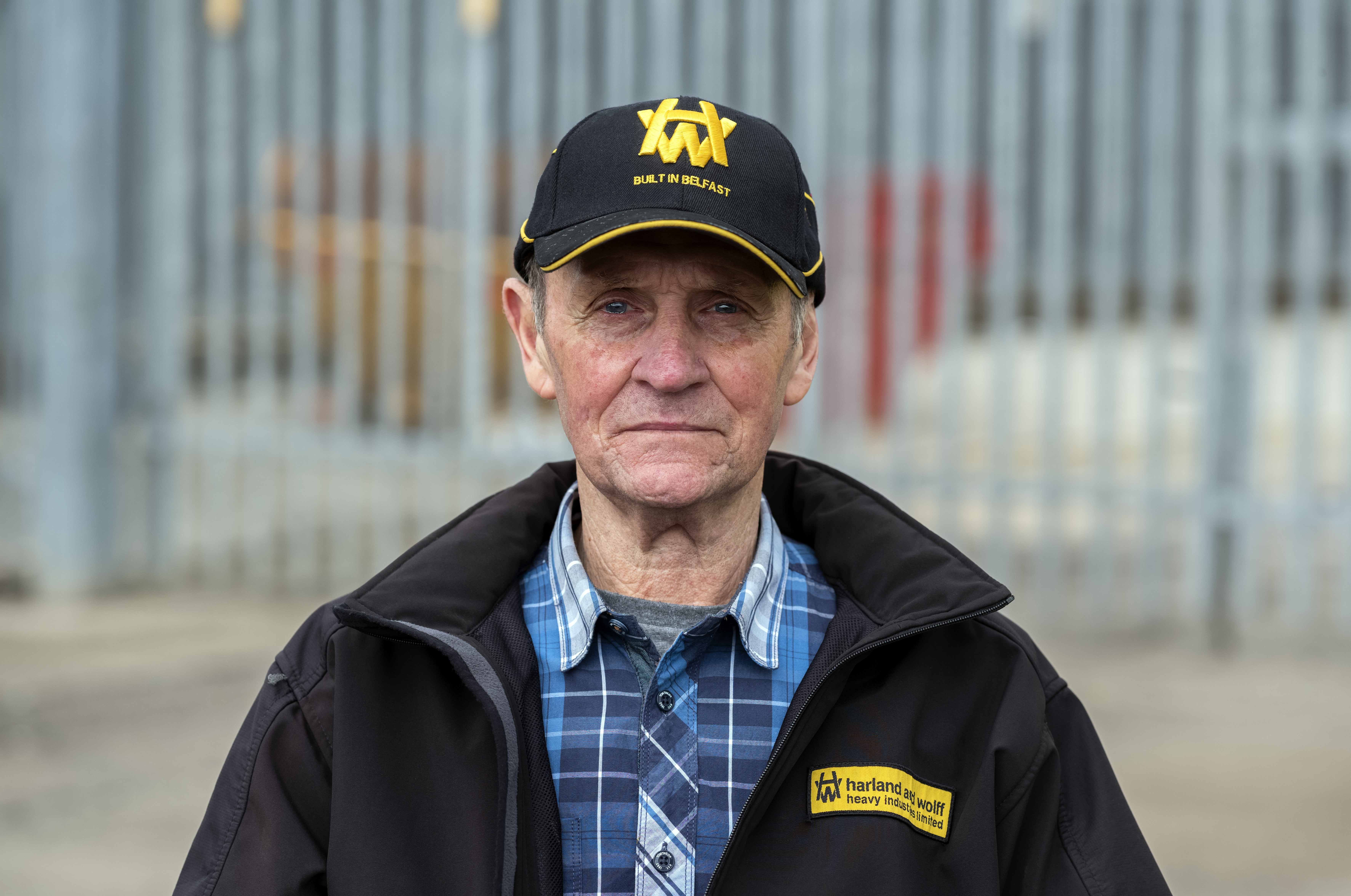
Crane driver Gordon Brown. Photo: Bobbie Hanvey
There are 170 million members of unions affiliated to the ITUC globally. There are also rival internationals, such as the WFTU, and smaller unions that don’t belong to federations. Altogether, hundreds of millions of workers worldwide belong to unions or some form of workplace organization. This makes the union movement the world’s biggest democratic membership movement. These unions defend rights at work, negotiate pay and conditions, and develop relationships with political parties, governments and business.
Is there a common thread that unites us all?
Same same, but different
Different countries have different industrial relations systems. Continental Europe favours social dialogue, with Works Councils and workers’ seats on company boards. In this power-balancing model, workers’ conditions are tied to the success of the company, the industry as a whole, the national economy and a healthy global trade environment.
The Anglo-Saxon model tends to be more oppositional from both sides, sometimes descending into a zero-sum game: what’s good for the workers is seen as bad for the company, and vice versa, and in the media, unions are presented as saboteurs undermining the public good and conspiring to protect privileged positions.
Politically, Western unions generally support social democracy, and are closely aligned to the centre left political parties that promote social dialogue.
For unions in the global south, anti-imperialism is often a feature of union politics, with calls to support local capital against foreign exploiters. Some unions in Turkey and many other countries are explicitly nationalist. In India, Africa and Latin America, unions sometimes use the language of Marxist-Leninism in their critique of capital.
In the Middle East and North Africa, unions like our Algerian affiliate SNATEGS are engaged in a primary struggle for basic democratic rights, such as freedom of assembly.
And of course, the biggest workforce in the world, in China, has no free unions at all.
Beyond these differences in political vocabulary and style, are unions fighting for the same things globally?
The first recorded strike in human history was by artisans building a mortuary complex for Ramses III at Deir el Medina in 1128 BCE. Since then, workers have taken collective action on many occasions, usually around the same issues: a living wage, working time, health and safety, dignity, and security of employment.
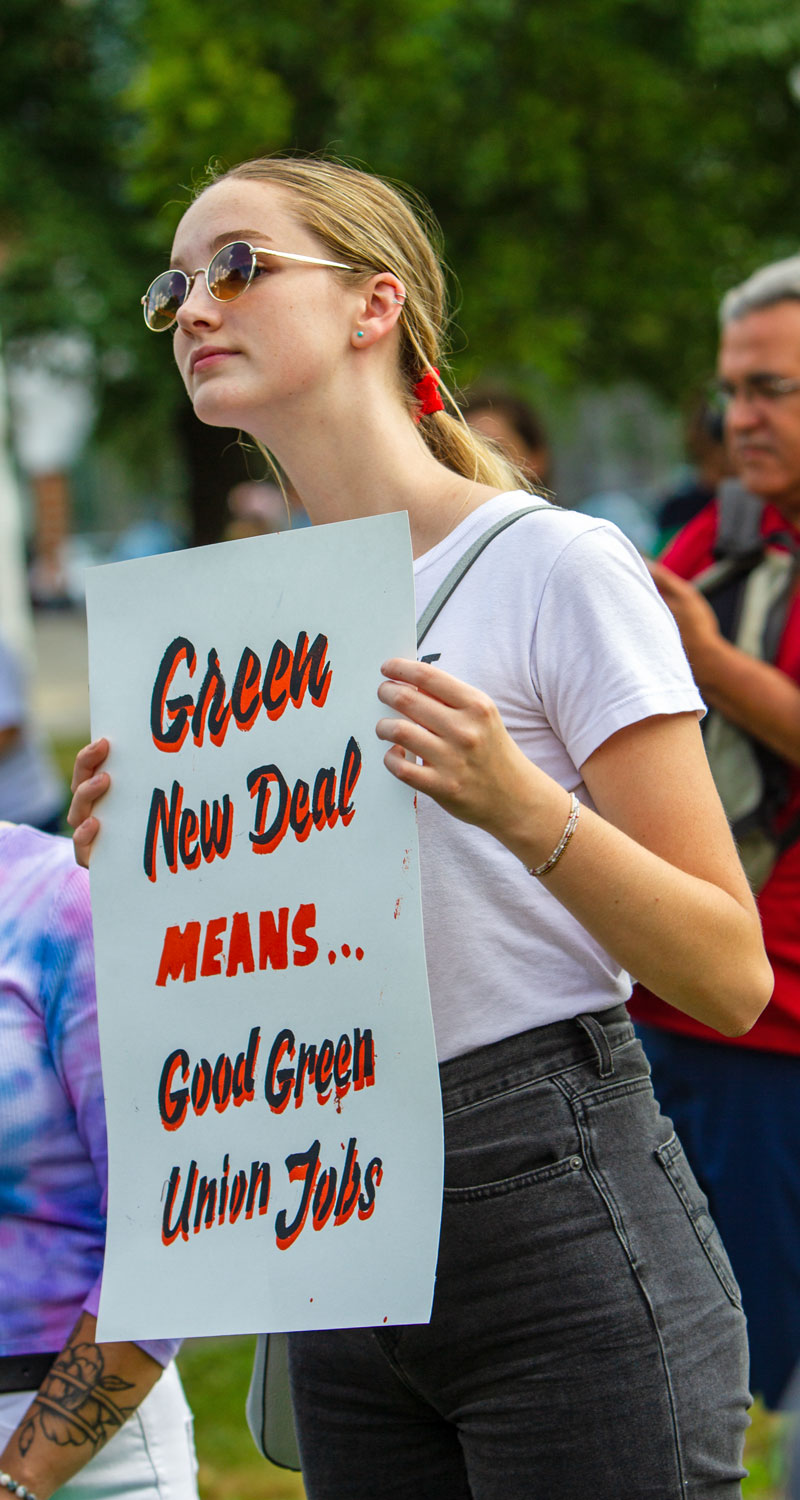
A demonstration in Detroit for a Green New Deal, July 2019. Photo: Becker1999, Flickr
From stonemasons in ancient Egypt to platform-based workers in the pulsating megacities of today, the struggle is essentially the same: for enough to live on, for free time, for a reliable income and an end to precarious work. But we live in interesting times: given the peculiar nexus of crises facing the world today, how do we frame those demands and make them part of a pathway to a better future?
Psychological warfare
Open any newspaper or social media feed, and you are likely to despair. The world is sleepwalking into a multifaceted crisis. For workers, there is a global crisis of employment, with 60 per cent of workers in the informal economy. This is likely to grow as automation spreads. There is a wage crisis in almost all sectors, with the majority of working families living on the edge, just one mishap away from disaster. We have a stagnant economy, threats of war between the US and Iran, and a trade war between the US and China. A No Deal Brexit – Britain leaving the EU without concluding an agreement – could lead to 700,000 job losses in Europe.
Then we have the climate crisis: urgent action is needed right now, today, to prevent catastrophe, but the Amazon is burning and the leader of the most powerful country in the world is a climate change denialist.
There is a crisis of multilateralism, with no ambition from world leaders to find collective solutions. IMF structural adjustment programmes have torn up the social contract, and deindustrialization and austerity are undoing the gains of social democracy.
People’s lives are being destroyed and the outlook is bleak.
Despair, however, is a weapon of the right. People who have lost hope, or who are angry, are easy to recruit to illogical reactionary politics. The unions’ task is to provide hope, vision and a plan for a better future.
The parade of despair is a form of psychological warfare: there are vested interests who want us to believe that resistance is futile, that we are powerless, that we have no hope of changing things. Credible solutions, like Just Transition, the living wage or a Green New Deal, are ignored or ridiculed in the media, while right-wing nonsense like austerity is treated as gospel.
“This is an age of anger, and there is a foment in the world. But we are disciplined. We are not distracted by every crisis,”
says ITUC general secretary Sharan Burrow.
“I am optimistic for the union movement, which has always been on the front line, and can now step into leadership.”
Moving beyond defensive struggles
Unions have often been characterized by “rational luddism” – the justified belief that new technological developments threaten jobs and relations of production. This hasn’t worked: from the original Luddites of the 19th century who smashed textile machines to the present, we have not succeeded in halting the dynamic of economic progress.
Our hope lies in shaping the future, not holding on to the past. Automation means that routine jobs will be first in line to be replaced by robots. The workforce of the future will be highly educated, working alongside sophisticated robots. Work is likely to become more specialized and artisanal. We need unions that reach these specialists, as well as precarious, platform-based workers, many of whom hustle between multiple apps and are legally defined as independent contractors.
Chaos under heaven; all is well
There is a global crisis of democracy. The success of the Chinese model of a capitalist economy under authoritarian control suggests the end of the link between capitalism and democracy. But democracy, at best, has only ever gone half way: every four or five years, we’d get a vote on who manages the economic system, but very little say in what the system compromises. Democracy stops at the workplace, and the needs of capital define political priorities.
This is why people have lost faith in parliamentary democracy: it is not improving their lives.
An old Chinese proverb says “Chaos under heaven; all is well.” It means that disorder and disruption is the best time to bring about major social and political change. The liberal economic and political order is falling apart, and the right is taking advantage of it, in what Naomi Klein calls “disaster capitalism” – using chaos to push through political changes, such as privatization, which would be rejected in more stable times.
Instead of restoring the liberal order, we can also use the brokenness of the system to push through change and bring democracy to economic life too. There is a gap in the political market for ideas about justice, equality, dignity and redistribution. The world is ready for bold ideas to address inequality, poverty and climate change.
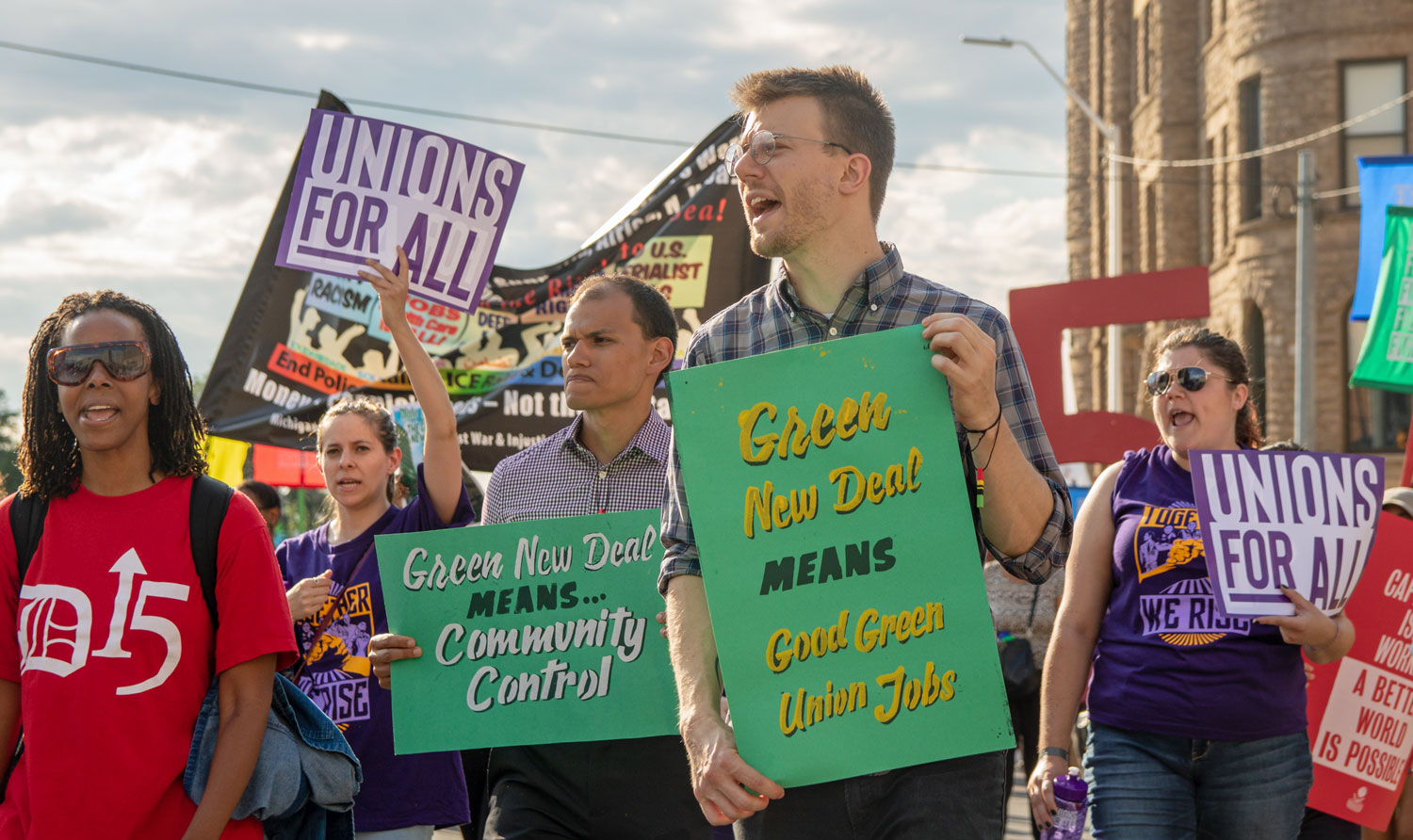
A demonstration in Detroit, USA for a Green New Deal, July 2019. Photo: Becker1999, Flickr
The global economic order was broken by the financial crisis. Centre right parties, major proponents of the small state, free market model, turned to culture wars and populism to deflect popular anger from their failed economic policies.
They use right wing nationalism, racism, homophobia, misogyny, climate denialism and a host of other bigotries very effectively: working class people, who have seen their living standards collapse over the past decade, have sometimes irrationally grasped at the targets offered to them.
One of the strengths of trade unionism is that it develops progressive politics for practical, rather than ideological reasons. Instead of convincing workers that racism and homophobia are morally wrong, we show how employers divide us by playing workers off against each other.
You don’t have to personally like workers in other countries and from different religions and cultures to recognize that it is in your interest to work together. And when we start working together, we build trust. Solidarity erodes bigotry.
This neatly sidesteps the culture war that the right is using.
The right has reached the end of the road, and has nowhere else to go: they have had to become increasingly extreme and radical to deflect popular anger, leading to existential political crises in the US, UK and elsewhere. These crises threaten democracy, and also the global economy and the wealth that they have sought to protect.
It is our turn now. We have the ideas to address the crises, and we need to boldly proclaim them. The best way to deliver economic and industrial democracy is to give real power to unions. If unions could make a substantive material difference to people’s lives, more people would join and be active.
We need to be bold. The political and climate crisis facing us is too great for timid, incremental change. Our role is not to promote a singular vision for the future, and attempt to rally people around it, but to develop a process that allows people to participate in imagining, designing and building a better future together.
The union movement is not the place for an ideological civil war between rival visions. Our first function is to bring workers together. But bringing these debates into the union movement empowers our members to be part of finding solutions.
We can use the brokenness of the system to push through change and bring democracy to economic life
Developing a vision
In the West, a political consensus is coalescing around the form of social democracy proposed by Bernie Sanders in the US and Jeremy Corbyn in the UK. Proponents argue for public ownership of essential resources, state investment in economic development, and free access to healthcare, education and so on, funded through a tax on the rich.
This is a capitalist-socialist hybrid that treats capitalism like nuclear power: dynamic, but dangerous, with important safety checks needed to prevent it from blowing up the global economy and destroying the planet.
Whether we agree with this vision or not, it is hugely useful, as it provides an alternative narrative to the neoliberal one that has dominated since 1994. Democratic capitalism has failed. The democratic socialist vision is still developing. Unions need to shape the debate. Many of them have begun, like our Australian affiliate the CFMEU with its “Goodbye Neoliberalism” report.
There are many radical ideas for the future which deserve serious consideration. Space constraints restrict us to a rapid sampling: one which doesn’t really align with the labour movement, and two which do.
Basic income
Basic Income is a twist on Keynesian economics that has received a lot of attention over the past few years, and city-level experiments have generated significant media attention. It aims to stimulate the economy, and deal with job losses, by giving everyone a guaranteed amount of money, enough to live on, without the requirement to work.
Unions are suspicious of this idea, because it breaks the link between work and pay, and the withdrawal of labour as a source of workers’ power. It risks rendering a vast part of the population politically powerless, recipients of funds that they rely on, but with no influence on production.
Another objection is that it amounts to a huge public subsidy for the private sector: instead of giving people free money to buy things at market rates, why not use those funds to make things like education, health and public transport free?
The UN Sustainable Development Goals
The Sustainable Development Goals are a multilateral attempt to build a better world by 2030. The plan aims to end poverty and reduce inequality, promote gender equality, address climate change and more. All UN member states have signed up to the goals – but unless countries take action, we will miss the targets. The goals fit with a lot of union ideas, like Just Transition. We should all pressurize our national governments to take action to meet the targets.
Green New Deal
The Green New Deal is modelled on the New Deal that pulled the US out of the Great Depression with massive public investment. The policy was copied in other countries, and people today benefit from dams and hydroelectric schemes, roads and infrastructure built in that period.
A Green New Deal aims to spend trillions of dollars to address climate change, creating hundreds of thousands of jobs in renewable energy, public transport, environmental cleanup, rewilding and more.
This seems politically impossible, but it has been done before: with the original New Deal, and with the Marshall Plan which reconstructed Europe after the Second World War and facilitated the golden age of social democracy. And much more recently, the financial crisis. It is a question of political will: if we can bail out the banks, we can bail out the planet.
We need to unite, in solidarity, in defense of workers' rights. We need an open and respectful debate about the future.
At the conference of the UK Labour Party in September 2019, the party adopted an ambitious Green New Deal policy, with the support of seven trade unions, including IndustriALL affiliate Unite. The policy calls for zero carbon emissions by 2030, massive investment in renewable energy, a Just Transition to unionized, green jobs, public ownership of resources and enhanced public transport.
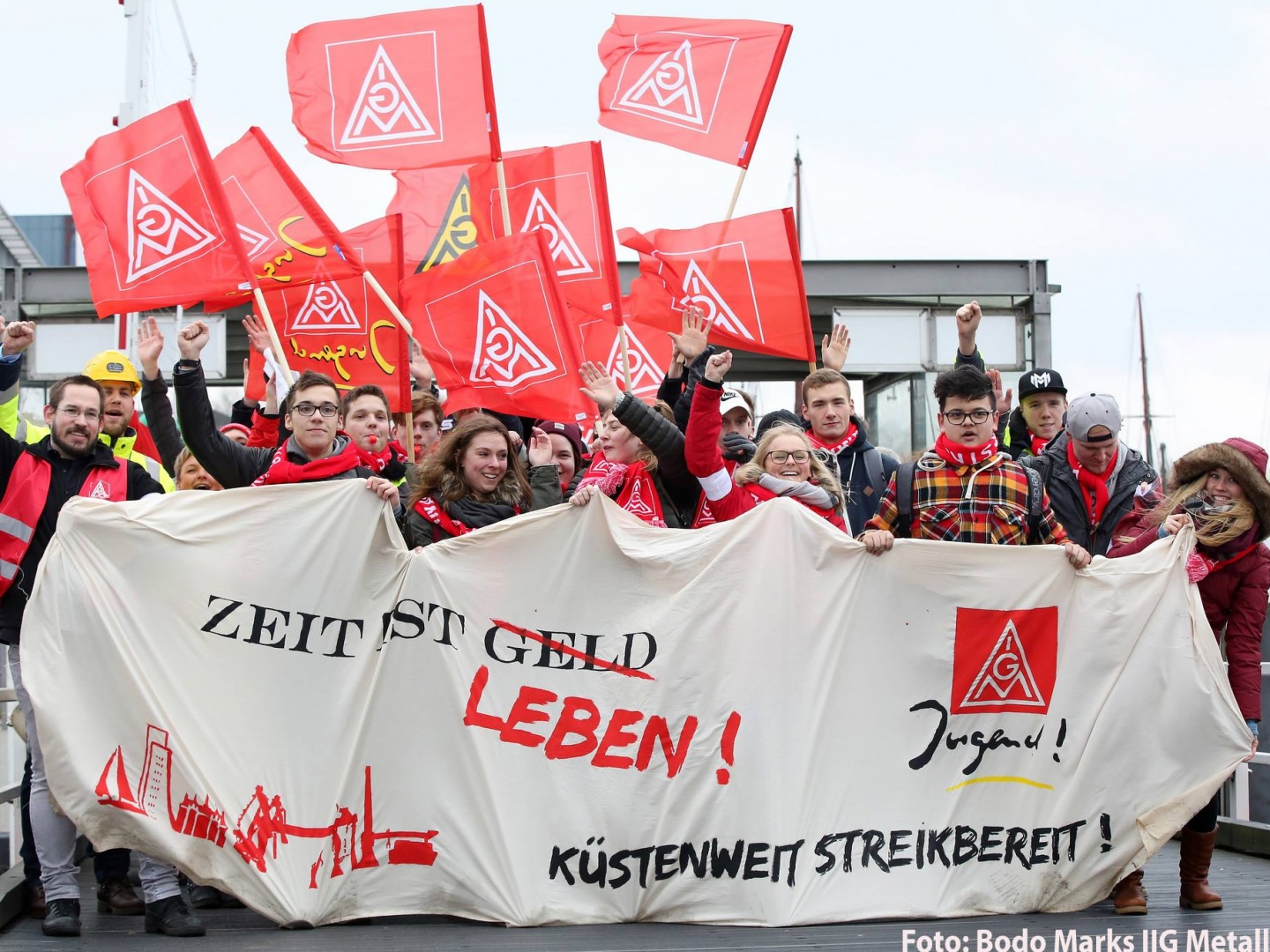
"Time is life!" IG Metall members demonstrate for a better work-life balance. Photo: Bodo Marks/IG Metall
Applying union solutions at global scale
These ideas work, and unions have a successful track record of applying them at local level. In Germany, IG Metall successfully argued in a collective bargaining round in early 2018 that workers should benefit from the productivity gains brought about by new technology, and won an agreement giving workers the right reduce their hours to 28 per week for up to two years.
And in Spain, unions representing coal miners won a landmark Just Transition deal in 2018 that will see large scale investment in mining communities, with reskilling, the development of new industries and more.
We need more victories like this, and we need them at scale.
We need to defend democracy – in our unions, and in society – and a create a new, global social contract. We need global multilateralism, such as that promoted by the Sustainable Development Goals. We need state-lead approaches, such as the Green New Deal, with a push towards public ownership and investment in sustainable industry. But not all change can come from the top: we also need grassroots initiatives, such as unions negotiating collective agreements that address these concerns.
Workers needs differ in different times and places, as the balance of power between the state, business and other actors shifts. Unions need the freedom to respond to local conditions. The solution is not to develop a single vision, but an inclusive process, through which a vision emerges through practice.
We need to unite, in solidarity, in defence of workers’ rights. We need an open and respectful debate about the future. With hope in our hearts, and solidarity and mutual respect as our guides, today’s unions can navigate the interesting times that we live in, and open the doors for mass participation in building a better world:
A future that works for all.
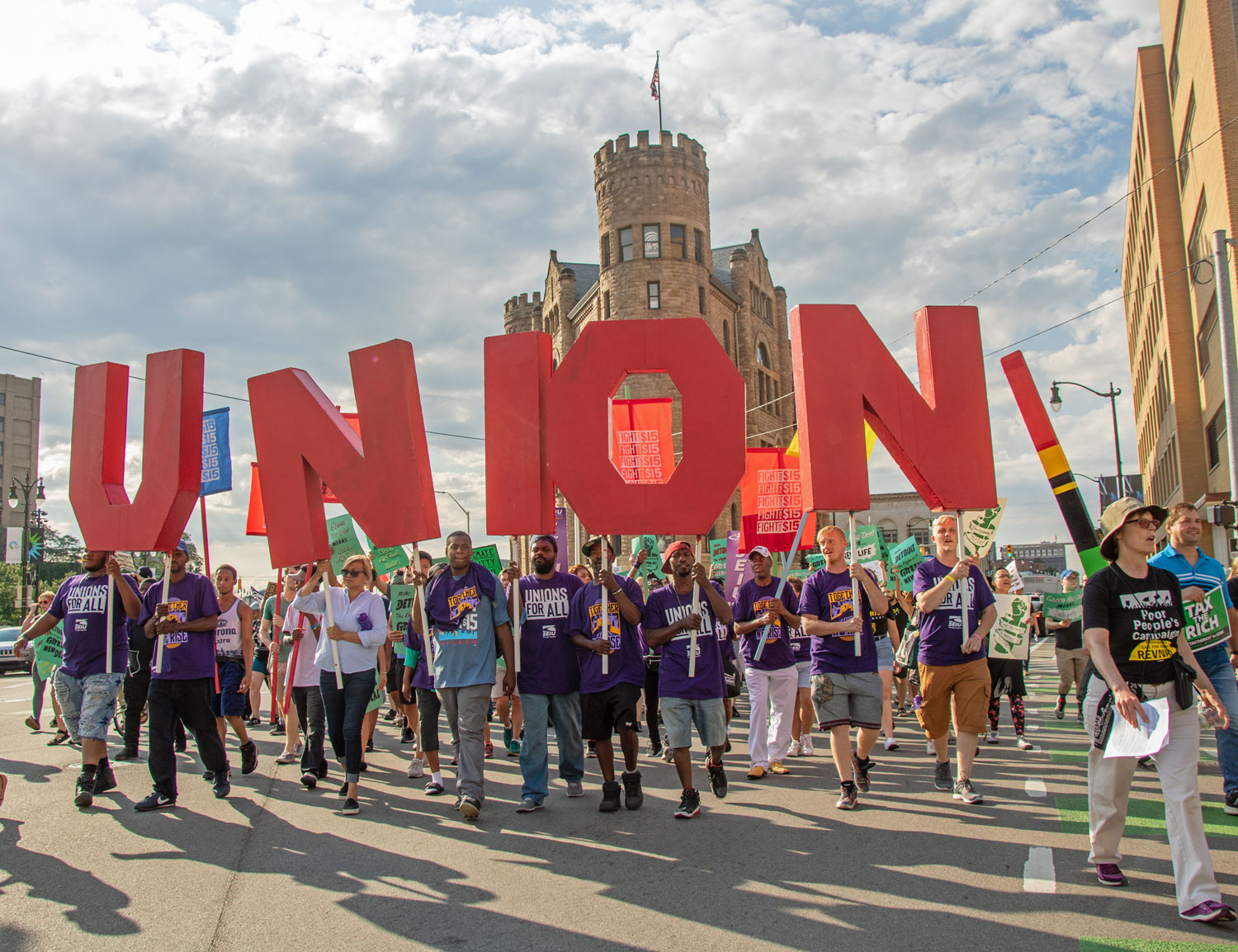
A demonstration in Detroit, USA for a Green New Deal, July 2019. Photo: Becker1999, Flickr
